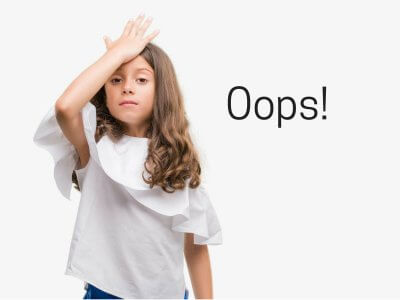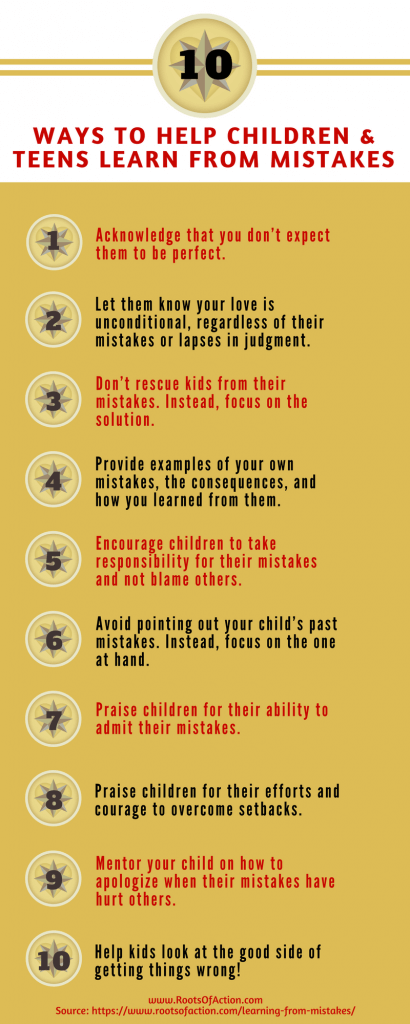
Learning from mistakes and errors is an important part of child and adolescent development. Most adults understand this concept. Yet, we have failed to teach our children that there is a positive side to getting things wrong.
Many children grow up in a society that pressures them to be perfect – to get the highest SAT scores, to land prized scholarships, to get into the best universities. Parents correct or complete children’s homework to improve their grades. They argue with teachers who try to point out a child’s areas of weakness that need improvement.
How does all this focus on testing and perfection affect kids’ learning? And how can we help them understand that learning from mistakes is part of healthy development?
Why is it Important to Learn from Mistakes?
Whether it involves homework, developing friendships, or playing a sport, learning is enriched through error. Learning from mistakes is part of how we challenge ourselves to learn to do things differently. It motivates us to try new, innovative approaches to problem-solving. Throughout a lifetime, learning from mistakes helps develop wisdom and good judgment.
In the Scientific American article, Getting it Wrong: Surprising Tips on How to Learn, research makes the case for more challenging tests that force kids to make errors. Historically, educators have created conditions for learning that do not encourage errors. And parents have followed suit. For example, if we drill children over and over again with the same math problem, they will eventually remember the answer. And if they are lucky, they will remember the answer on a standardized test.
This approach to learning assumes that if students are allowed to make mistakes, they will not learn the correct information. However, recent research shows this to be an incorrect assumption. In fact, studies have found that learning from mistakes enhances rather than detracts from learning.
Learning from Mistakes Improves Effort & Motivation
Carol Dweck, a professor at Stanford, studies the importance of challenging children to learn from mistakes. Her research shows that praising children for their intelligence can actually make them less likely to persist in the face of challenge. She and her colleagues followed hundreds of 5th-grade children in New York City schools. One group was praised for their intelligence while the other group was praised for their effort.
When the 5th graders were challenged with an extremely difficult test designed for 8th graders, a surprising result occurred. The students who had been praised for their effort worked very hard, even though they made a lot of mistakes. The kids praised for being smart became discouraged and saw their mistakes as a sign of failure. Intelligence testing for the kids praised for their effort increased by 30% while the kids praised for their intelligence dropped by 20%.
Giving meaningful and specific praise motivates children who are learning from mistakes. Praise should focus on developing their character strengths, helping them understand their internal abilities. It is an opportunity to develop a child’s resilience, one of eight core abilities in The Compass Advantage.
Ten Ways to Help Children & Teens Learn from Mistakes
- Acknowledge that you don’t expect them to be perfect.
- Let them know your love is unconditional, regardless of their mistakes or lapses in judgment.
- Don’t rescue kids from their mistakes. Instead, focus on the solution.
- Provide examples of your own mistakes, the consequences, and how you learned from them.
- Encourage children to take responsibility for their mistakes and not blame others.
- Avoid pointing out your child’s past mistakes. Instead, focus on the one at hand.
- Praise children for their ability to admit their mistakes.
- Praise children for their efforts and courage to overcome setbacks.
- Mentor your child on how to apologize when their mistakes have hurt others.
- Help kids look at the good side of getting things wrong!(Get the infographic at the end of this article!)
Encouraging Your Child When Mistakes Happen
Learning from mistakes and failures isn’t easy. All children need encouragement to learn and succeed. Positive words from parents, teachers, and mentors during difficult learning challenges is essential for children’s growth and development.
One of the most popular articles at Roots of Action lists 40 Meaningful Ways to Share Encouraging Words for Kids. Check it out! The article also discusses the difference between encouraging words and praise.
Learning from Mistakes – Quotes for Kids
At Roots of Action, we’ve devoted an entire series of articles to quotes that promote healthy youth development. Quotes can be used and discussed with all ages of children. Often, quotes help children learn about themselves and the world around them. Quotes can inspire kids to become their best selves! Learn how to use quotes at home and in the classroom!
Below are ten quotes that may be helpful in helping children who are learning from mistakes:
- I have never felt I was wasting time. Science is a process of trial and error. The only sure way to avoid making mistakes is to have no ideas. ~ Albert Einstein
- Creativity is inventing, experimenting, growing, taking risks, breaking rules, making mistakes, and having fun. ~ Mary Lou Cook
- Knowledge rests not upon truth alone, but upon error also. ~ Carl Jung
- If you have made mistakes, even serious ones, there is always another chance for you. What we call failure is not the falling down but the staying down. ~ Mary Pickford
- Mistakes are the portals of discovery. ~ James Joyce
- If you’re not making mistakes, you’re not making decisions. ~ Catherine Cook
- Success does not consist in never making mistakes but in never making the same one a second time. ~ George Bernard Shaw
- While one person hesitates because he feels inferior, the other is busy making mistakes and becoming superior. ~ Henry C. Link
- Feelings of worth can flourish only in an atmosphere where individual differences are appreciated, mistakes are tolerated, communication is open, and rules are flexible — the kind of atmosphere that is found in a nurturing family. ~ Virginia Satir
- You cannot teach a child to take care of themselves unless you will let them try to take care of themselves. They will make mistakes; and out of these mistakes will come their wisdom. ~ Henry Ward Beecher
Infographic to Use and Share
Feel free to use, share, or print this infographic to remind yourself of the ways adults support children and teens as they learn from mistakes.
Related Articles
Successful Kids Need 8 Core Abilities: How to Parent With Purpose
How Kids Learn to Take Initiative and Overcome Challenges
Goal Setters Often Become Peak Performers
(This article was originally published May 24, 2011. It was updated and revised with new research and resources August 2, 2018.)
Published: August 2, 2018
Tags: learning, parenting, positive youth development, praise




